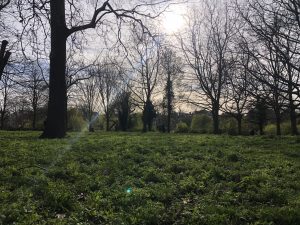
Regent’s Park. Photo Credit: Sara Bell
“As a woman I have no country,” Virginia Woolf wrote in Three Guineas, and also in the Passage Identification section of my spring Contemporary Civilizations final exam. She continued: “As a woman I want no country. As a woman, my country is the whole world.”
I’d bet that passage IDs rarely make top-ten lists of best moments from the Core. Most of my favorite memories of CC are the kind of experience for which students come to Columbia: debates about Aristotle lively enough to bring my classmates and I out of our seats, long afternoons outside reading Hegel during that one sunny week in March. But that passage was striking enough to make me go home that summer and reread Three Guineas. In fact, it was striking enough to make me decide to study abroad. What better way to test this proposition than to move another 3,000 miles further from home?
I was intimidated to discover that literature courses in the UK operate pretty differently from those in the US, and that the only assessment for all of my English Literature courses would be a portfolio of research papers, no prompts or guidelines other than a length requirement. It was a different way of approaching the question of literary analysis than I had seen thus far in college, and more independent by far: yet another way of approaching writing, to go with another way of approaching day-to-day life.
The irony of talking about my study abroad experience right now abounds. As planned, I wrote about 28,000 words of literary criticism to turn in at the end of the semester, but I ended up clicking submit at the end of April in a very different world than the one I had begun writing in, than the one I had originally read Woolf in. So much for being a woman of the world: I am now a woman of my childhood bedroom and, when I want to take a turn about the park, my parents’ backyard. These days, nothing feels new; in London, nearly everything was, or at least appeared in a different light.
Newness is one thing that intimidates me greatly about research in the humanities, particularly as an undergraduate: part of the point of research is novel contribution. It takes a good dose of self-confidence, and maybe a bit of egotism, to say ‘Hey, I have something new to say about Macbeth,’ but we do it anyways—partly, of course, for the practice of asking and answering questions. But I learned in my research in London that we also practice the struggle to be novel itself. One of the delightful things about studying literature is that, in surveying a range of texts, you notice how humans manage to keep asking ourselves the same questions and coming up with wildly different answers, in strange parallel to the way we continue to have vigorous debate about Homer and Shakespeare. When you have the freedom to research and write what you wish, you have to engage with that continuum of human experience as part of your academic work, to pick up the same work and look at it in a different light.
The personal freedom of studying abroad—a new school, a new set of responsibilities—and the academic freedom of independent research coincided in curious ways. I thought about Woolf’s words every time I walked through Regent’s Park; I thought about them while I wrote. I had fallen in love with Mrs. Dalloway’s vision of London, and walked it in very different shoes. As a woman temporarily living in a country built off of the enslaved colonial labor of one side of my family, was my country also the whole world? Or was the situation entirely more complicated for me than Woolf made it out to be?
That passage ID ended up fueling some of the best research papers I wrote while abroad. One paper topic from this spring, on Jane Austen’s Emma: Emma Woodhouse walks a line between Knightley’s male vernacular and logic and the cheaper world of gossip, a lexical outsider who is more powerful for it. Another on Toni Morrison’s reinvention of ancestry in Song of Solomon: Pilate reframes the apparent dichotomy between black nationalism and white American capitalism with a framework of heritage situated entirely outside of economics, the odd woman out both in her community and in American history.
The notion of novelty is a challenge, sure, but also a delight, an aspect of the history of thought that you can tap into via the freedom of your own research. How many ways can you walk around the same park?
